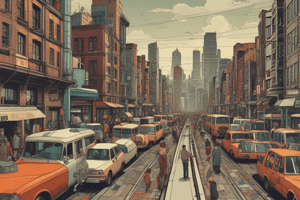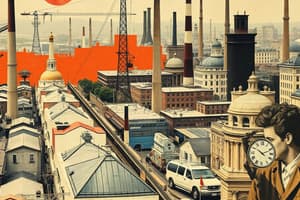Podcast
Questions and Answers
What is a key factor that influences social change?
What is a key factor that influences social change?
- Type of political organization (correct)
- Cultural influences
- Environmental factors
- Economic systems
In which type of society does the influence of political organization have a minimal impact?
In which type of society does the influence of political organization have a minimal impact?
- Hunting and gathering societies (correct)
- Industrial societies
- Agricultural societies
- Post-industrial societies
What has contributed to the acceleration of social change in the modern period?
What has contributed to the acceleration of social change in the modern period?
- Rise of democratic governments
- Globalization of economies
- Development of science and secularization of thought (correct)
- Advancements in technology
What has been a fundamental part of the establishment of most traditional states?
What has been a fundamental part of the establishment of most traditional states?
What is a characteristic of the modern outlook?
What is a characteristic of the modern outlook?
What is a key aspect of modern ways of life?
What is a key aspect of modern ways of life?
What has changed in the modern period, in addition to how we think?
What has changed in the modern period, in addition to how we think?
What are ideals that are largely creations of the past two or three centuries?
What are ideals that are largely creations of the past two or three centuries?
What has been the impact of military power on traditional states?
What has been the impact of military power on traditional states?
What is a key factor that can influence the direction of social change in a society?
What is a key factor that can influence the direction of social change in a society?
Study Notes
Characteristics of Industrial Societies
- Most of the employed population work in factories, offices, or shops, rather than in agriculture.
- Social life in cities becomes more impersonal and anonymous.
- Large-scale organizations, like business corporations or government agencies, influence daily life.
Nation-States
- Industrial societies were the first nation-states to exist.
- Nation-states are political communities divided by clear borders.
- National governments have extensive powers over citizens' lives, framing laws that apply to all citizens.
Modern World: Industrialized Societies
- Industrialization led to advanced military organization and changed ways of conducting war.
- Globalization has been characterized by violence and conquest.
- Virtually all societies in the world today are nation-states.
Global Development
- Western countries established colonies in traditional societies, using military strength when necessary.
- Colonialism shaped the social map of the globe.
- Industrialized societies are referred to as developed societies.
Political Systems
- Political leaders and government officials constantly affect the lives of the mass population.
- Governments stimulate and direct social change, influencing economic growth and production.
- Military power and war have been important in shaping global events.
Globalization
- Globalization refers to the increasing interdependence of individuals, groups, and nations.
- The process of globalization is often portrayed as an economic phenomenon.
Factors Influencing Social Change
- The natural environment is a physical constraint on social change.
- Political organization strongly influences social change.
- Military power has played a fundamental part in the establishment of traditional states.
Change in the Modern Period
- The modern period has seen a huge acceleration of social change towards globalization.
- The development of science and secularization of thought have contributed to the critical and innovative character of the modern outlook.
Cultural Influences
- Ideals of freedom, equality, and democratic participation are creations of the past two or three centuries.
- Modern ways of life require a 'rational' basis, rather than relying on traditional authority.
Studying That Suits You
Use AI to generate personalized quizzes and flashcards to suit your learning preferences.
Description
This quiz explores the key features of industrial societies, including the shift from agricultural to industrial work, changes in social life, and the influence of large-scale organizations.




